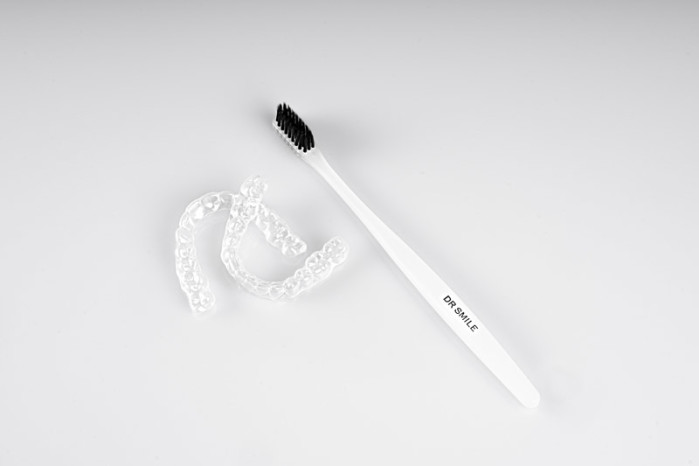Healthy gums are just as important as healthy teeth

Gleaming white, straight teeth stand for health and, nowadays, are very easy and quick to attain using the latest technology. You can bleach your teeth from within your own four walls with home whitening kits, and crooked teeth can also be easily correct at home with the aid of clear aligners. But beautiful teeth alone are not enough, because if the gums cause problems, this can be very uncomfortable. Minor ailments can develop into gum disease if not attended to, which not only causes pain but can also impair the beauty of the smile.
White gums: what their colour says about health
The colour and structure of the gums are good indicators of the health of your oral cavity. That is why it is important to always keep an eye on both, so that you can act as quickly as possible in the event of any changes. The structure of the gums should always be firm and smooth, regardless of their colour.
Light to dark pink: healthy and well-looked-after gums.
Brown: the natural colour of the gums for darker skin colours. A lot of sunbathing can also cause the gums to brown. This is due to the increased melanin.
Red: a sign of inflammation or infection. If this is the case, you should visit a dentist.
Yellow: a sign of inflamed gums. Better oral hygiene can often help. Yellow sores, on the other hand, can be a sign of a viral infection or an ulcer.
White: may occur as a result of a viral infection. Isolated white spots are also possible. A white film, on the other hand, is often the result of a fungal infection. Both cases should be treated by a doctor. White spots after whitening will go away on their own.
Grey: a sign of a weakened immune system. Often related to a bacterial infection, and should be treated by a doctor.
Black: can occur as a result of tobacco use or certain medications. Again, a doctor should be consulted.
Gum pain is unpleasant.
Everyone has probably had pain in their gums at some point. The reason for this is always inflammation in the oral cavity, which is either caused by mechanical irritation, such as when brushing your teeth or after having your teeth cleaned or a filling, or the trigger for the inflammation is a viral, bacterial or fungal infection, such as in the case of abscesses or a blister. The affected area usually feels sore and burns, or is red and swollen. Depending on how bad this is, one can experience an uncomfortable pulsating sensation and bleeding gums. Gum pain is often associated with bad breath (halitosis).
Swollen gums
Swollen gums are uncomfortable, but the causes for them are usually harmless. They should be corrected, though, to prevent worse gum disease. Swollen gums are often reddened and have come somewhat loose. The reason for this is plaque bacteria that accumulate in the mouth. If they stay in the mouth for a prolonged period and are not removed through regular oral hygiene, the gums can become swollen. Thoroughly brushing your teeth can be sufficient in such cases and prevent inflammation of the periodontium.
Dental treatments are another reason for swollen gums. It is completely normal for the gums to be irritated and swollen after having wisdom teeth extracted or after a root canal treatment. However, these symptoms should go away on their own after a few days. If not, you should consult your dentist again.
Inflammation of the gums
If the gums are reddened and you experience bleeding when brushing your teeth, your gums are inflamed. The inflamed area is swollen, and you may experience tenderness upon pressure. If the inflammation is severe, pus can also form, which then seeps out when pressure is applied. Like with swollen gums, the cause of inflamed gums is the accumulation of too many bacteria due to poor oral hygiene. The germs feed on food scraps that contain sugar and starch and form a film on the surface of the teeth and at the transition from the teeth to the gums. The bacteria can multiply particularly well in this area, thus causing inflammation. Things get dangerous when the inflammation makes it from the gums to the periodontium. The bacteria can attack the bones and get into the bloodstream. This is called periodontitis. This kind of gum disease is irreversible and the most common cause of tooth loss in old age.
When gums recede
Do your teeth suddenly appear longer and also feel more sensitive to pain than usual? In this case, the gums may have receded. This often happens as a result of the most severe form of gum disease, periodontitis. The bones and tissues that surround the teeth get damaged by the inflammation. The gums recede and the teeth may become wobbly or, in the worst case, be lost. If the gums recede, you should definitely see a dentist, because periodontitis is not always to blame. Other reasons may include, for example, vitamin deficiency, smoking, stress, medication or a weakened immune system.
What should I do if I have issues with my gums?
Whether swollen, tender or inflamed, when the gums are not healthy, they can often be very uncomfortable. What can we do, though, to alleviate the pain or, even better, to prevent gum problems?
Can home remedies help?
Home remedies can, indeed, often help reduce gum discomfort. Anti-inflammatory agents, in particular, will soothe inflamed or swollen gums and have beneficial effects.
Chamomile: works as a disinfectant and has a calming effect. Repeated rinsing with chamomile tea alleviates the symptoms of inflammation.
Sage: has similar effects to chamomile tea and can be used as an alternative.
Massage: a light massage with a toothbrush stimulates the blood circulation and promotes the healing process.
Salt water: rinsing with salt water fights bacterial growth.
Coconut oil: rinsing or massaging the affected areas with coconut oil cares for the oral mucosa.
Essential oils: clove, tea tree and peppermint oil have an antiseptic effect and help prevent inflammation. However, due to their strength, they should be used in diluted form as a mouthwash.

Ointments, gels & toothpaste
In the event of inflamed or receding gums, you should always speak to a dentist first. If necessary, they will prescribe a gel or ointment or recommend a specific toothpaste to strengthen the gums. Often, special pastes for the gums are a bit stronger and remove more plaque bacteria than normal toothpastes do.
Caring for gums properly prevents gum disease
There is no secret tip for healthy teeth and healthy gums, because, actually, each of us knows exactly what it's all about. Thorough and, most importantly, daily oral hygiene in the morning and in the evening is utterly sufficient and can save us a lot of pain. It's so simple, and yet unfortunately it's too often neglected. That's why we've listed everything again here that needs to be a part of your oral care:
Correct tooth brushing twice a day
Use of dental floss
Rinsing with a mouthwash
Cleaning the tongue with a tongue brush
Regularly replacing the teeth cleaning products
Dental prophylaxis with a professional teeth cleaning 1–2 times a year
How to strengthen your gums
A healthy and balanced diet and good oral hygiene are essential for healthy, strong gums. Bacteria can multiply quickly, especially when you enjoy foods that contain sugar or starch. In order to strengthen your gums, it is important to keep the bacteria in your mouth in check with the right care and to counteract the formation of plaque. This way, you wil not only prevent gum problems, but also tooth decay. If you still get some mild discomfort all the same, home remedies can quickly help to heal your gums. If your symptoms get worse, you shouldn't hesitate to make an appointment with the dentist.
Building up your gums again
Once the gum is gone, it will no longer grow back again naturally. Unfortunately, a healthy diet or the use of home remedies will no longer help. Receding gums are irreversible, and they can only be built up again through dentistry treatments. In such a cases, periodontal treatment is carried out first in order to put a stop the patient's complaints. If the gums are receding very heavily, a gum transplant may be considered to rebuild the gums.